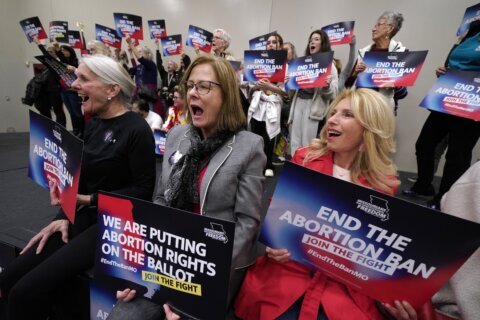Excerpts from recent editorials in the United States and abroad:
May 17
The Washington Post on Trump’s promises of tax cuts and deregulation
Even after all the alarming antics former president Donald Trump has engaged in over the past decade, it was jarring to learn what he said to about two dozen oil company executives at an April 11 dinner in his Palm Beach, Fla., mansion, Mar-a-Lago. As The Post reported, Mr. Trump responded to one executive’s complaint about the burdensome regulations the industry faces under PresidentBiden, despite spending $400 million on lobbying against them. He told them they should instead donate $1 billion to his presidential election campaign, in return for which they would get lighter regulation and lower taxes — a much better “deal.” To be sure, it’s impossible to know whether this was a serious quid pro quo or just another case of the former president’s off-the-cuff bombast. Perhaps we’ll learn more if an inquiry by House Democrats gains traction. The troubling appearance, so consistent with Mr. Trump’s generally unprincipled approach to politics and government, is evident, though.
Mr. Trump’s placing of a “for sale” sign on his administration’s tax and regulatory policy — however seriously — raises the question of how U.S. business leaders generally view the upcoming election. The oil and gas industry is a special case, since it is unusually dependent on federal environmental policy and many industry leaders are known for ultraconservative politics. Still, the CEOs at Mar-a-Lago represented part of a broader private sector that will soon face the same choice that all voters do: Mr. Trump or Mr. Biden. This, despite the fact that traditional Republican private sector leaders tried to promote alternatives to Mr. Trump, such as former U.S. ambassador to the United Nations Nikki Haley, in the GOP primaries. They face this choice at a time when the two parties are no longer so clearly distinguishable on some key economic policies, largely because Mr. Trump has injected a note of populist protectionism into what was once a free-market Republican ideology. Meanwhile, the private sector itself is less coherent and its collective self-interest less clearly defined. Entrepreneurial billionaires such as Elon Musk, who recently hosted an “anti-Biden” dinner party for other executives and investors, set their own agendas.
Business advocates have understandable grievances with Mr. Biden. Not only has he kept the vast majority of Mr. Trump’s tariffs, but he has also added more. His regulatory and antitrust push has also gone too far at times, especially in his ban on liquefied natural gas exports. Still, the president has overseen strong macroeconomic performance. Despite inflationary challenges, the United States has recovered from the pandemic much more robustly than other leading economies. The stock market is at record levels. Corporate profits hit an all-time high in 2022 under Mr. Biden and have remained elevated. Then there’s the fact Mr. Biden has shepherded bipartisan legislation that spends billions to resurrect U.S. manufacturing and repair the nation’s infrastructure. And, yes, U.S. oil production also soared to a record, even if the industry doesn’t give him credit — and even if the president, deferring to environmentalists in his coalition, is reluctant to take any.
There is little guarantee a second Trump term would be a net benefit for the private sector in terms of policy. His first term resulted in the largest corporate tax cut in U.S. history and many regulatory rollbacks, to be sure. But he’s openly talking about a 10 percent tariff on all imports — “a ring around the country,” as he puts it, which would be inflationary and chaotic. He is clear that he wants to not only restrict immigration but also deport millions of people, a recipe for social conflict and scarcer labor. Mr. Trump’s followers seem interested in trimming the Federal Reserve’s political independence.
More fundamentally, another four years of Mr. Trump would be hard to square with business’s usual preference for social and political stability, at home and abroad. His denigration of institutions such as NATO harmed U.S. standing in the world and sowed uncertainty about Asian and European security. His hostile words about Muslims and immigrants, along with occasional shots at iconic American brands, fueled culture wars. And all of that was before the violent disaster on Jan. 6, 2021. Like other Americans, many executives probably hoped Mr. Trump would give way to a more conventional Republican nominee in 2024. That has not happened. He’s running neck and neck with Mr. Biden even as his language and behavior get more extreme.
The strengths of American business have always been innovation and flexibility, leavened, in politics, by a sense of enlightened self-interest. The 2024 election poses a test of those strengths
ONLINE: https://www.washingtonpost.com/opinions/2024/05/17/trump-tax-cut-big-business/
___
May 17
The Wall Street Journal on out-of-state abortions
Two years after the Supreme Court reversed Roe v. Wade, some states have moved to limit abortions while others become sanctuaries. The figures tell the story: In 2023, according to the Guttmacher Institute, patients traveling across state lines accounted for 41% of abortions in Illinois, 69% in Kansas, and 71% in New Mexico. Each of those states borders tighter jurisdictions.
The political fallout still isn’t clear, but a legal question now percolating is whether restrictive states can make it a crime to help a woman obtain an abortion elsewhere. Alabama Attorney General Steve Marshall has argued yes, but the answer from a federal court last week is no. “The Attorney General cannot constitutionally prosecute people for acts taken within the State meant to facilitate lawful out of state conduct, including obtaining an abortion,” writes Judge Myron Thompson.
Alabama has a law punishing any “conspiracy formed in this state to do an act beyond the state, which, if done in this state, would be a criminal offense.” The state was sued by the nonprofit Yellowhammer Fund, the Alabama Women’s Center and other plaintiffs. Collectively, the judge says, they “receive as many as 95 weekly inquiries from clients about the availability of out-of-state abortions.” Before responding, they want a declaratory judgment that they can’t be prosecuted.
In a motion to dismiss, Mr. Marshall argued Alabama’s law “does not forbid a woman from leaving the state to obtain an abortion,” but instead merely “regulates certain assistance,” and in any case it’s “supported by strong, legitimate interests including preserving unborn life.” So far Judge Thompson has merely denied the motion to dismiss, although in a way that suggests his view of the law and the Constitution.
The core of his ruling is on the right to travel. The judge says it goes back at least to the Magna Carta in 1215, which promised “all merchants may enter or leave England unharmed and without fear.”
After U.S. independence, the Articles of Confederation guaranteed citizens “free ingress and regress to and from any other State,” with “all the privileges of trade and commerce.” This was the backdrop for the Constitution, which entitles Americans today “to all Privileges and Immunities of Citizens in the several States.”
Justice Brett Kavanaugh went a similar route in a concurrence to Dobbs, the ruling overturning Roe. “As I see it,” he said, “some of the other abortion-related legal questions raised by today’s decision are not especially difficult as a constitutional matter. For example, may a State bar a resident of that State from traveling to another State to obtain an abortion? In my view, the answer is no based on the constitutional right to interstate travel.”
Judge Thompson’s small extension is to say that if a state can’t directly stop women from leaving for abortions, “it cannot accomplish the same end indirectly by prosecuting those who assist them.” If Alabama held such power, it’s hard to see the limiting principle. Other states could try to enforce their values by punishing anyone who helps their citizens fly to Las Vegas to gamble, to Colorado to smoke marijuana, or to Alaska to hunt majestic grizzly bears.
___
May 20
The Los Angeles Times on felon voting rights
Voting is not a privilege. It’s a right. But one group of citizens has been long denied that right in parts of the country.
In half the states, including California, people convicted of felonies who have served their time in prison re-enter their communities with the right to vote automatically and immediately restored. In Vermont, Maine and the District of Columbia, people retain their right to vote even when incarcerated.
But the other 25 states have at least some temporary voting restrictions on people formerly incarcerated on felony convictions. In 10 of those states, people convicted of certain crimes, such as murder and rape, are prohibited from voting permanently, unless in most cases the governor pardons them.
Forbidding people who finished prison sentences to vote is profoundly unjust — and unwise. It’s difficult enough for people convicted of a serious crime to make their way back into their communities, find jobs and reestablish relationships with family and friends. Disenfranchising them only stifles their efforts to re-engage not just in society but in our democracy. It’s even more outrageous when you consider that people returning from prison are counted in the U.S. census for purposes of representation in Congress and for the electoral college. (Even in prison, they get counted. )
So, it’s encouraging that Sen. Laphonza Butler (D-Calif.) has introduced a bill, the Next Step Home Act, that would restore voting rights in elections for federal offices, such as members of Congress, to some who were convicted of a felony and sentenced to federal prison when they return to their communities and finish out their parole (or probation in some cases). It would not apply to state elections.
However, Butler’s bill does not go far enough and would shut out too many people, benefiting mainly those who were released under the First Step Act. This bipartisan criminal reform bill was signed into law by former President Trump in 2018, and allows certain people to participate in rehabilitative programs that earn them credits toward shortening their time in prison or take advantage of sentencing reforms.
Butler’s bill also includes elderly offenders who are considered less likely to commit a crime again and reinstates their voting rights even if they are still under home detention, completing their parole.
But the nearly 30,000 people released under First Step is a fraction of the 3.5 million Americans no longer incarcerated but still disenfranchised from federal elections, according to the Brennan Center for Justice, which supports Butler’s bill.
So why would she seek to help only this particular segment of the former prison felon population? Because, it seems, that is what has a chance of passing both houses of Congress. This would need 60 votes to overcome a filibuster in the Senate, and according to a spokesperson for Butler, anchoring it to the First Step Act could help it garner the bipartisan goodwill of that previous bill.
In fact, there are at least three other Senate bills — the Democracy Restoration Act by Sen. Benjamin L. Cardin (D-Md.), the Freedom to Vote Act by Sen. Amy Klobuchar (D-Minn.) and the Inclusive Democracy Act by Sen. Peter Welch (D-Vt.) — that would restore the right to vote in federal elections to all formerly convicted felons. Butler is a co-sponsor of all three.
The bigger question is why is there such resistance to restoring the rights of people who were convicted of a felony. There is no valid reason or public safety concern that would argue against it. Giving back voting rights to a person released from prison is not the same as giving them a right to own a gun.
More troubling is that the laws used to stop people who were imprisoned from voting are rooted in racism that stretches back to before the adoption of the 15th Amendment to the Constitution in 1870 guaranteed the right to vote cannot be denied because of race. One way to stop Black people from exercising that right was to disenfranchise everyone convicted of a crime. Today, Black people are almost four times more likely than non-Black adults to be disenfranchised because of a past conviction.
Of course, we hope that Butler’s bill passes — even if it just chips away at the disenfranchisement of one group of people who were formerly convicted. But if Congress were really acting fairly and smartly, it would pass one of the bills that restores federal voting rights to all people convicted of felonies who have served their time. To ignore them is a transgression of justice and a violation of their constitutional rights.
Copyright © 2024 The Associated Press. All rights reserved. This material may not be published, broadcast, written or redistributed.







